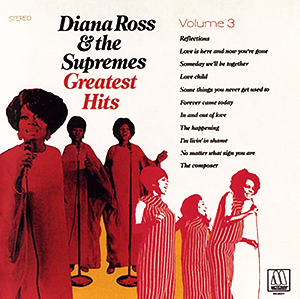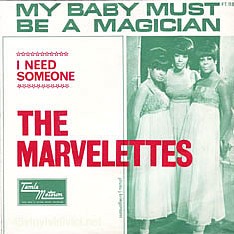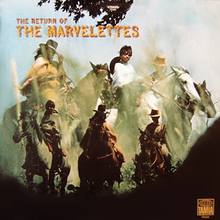
The Marvelettes were an American girl group that achieved popularity in the early to mid-1960s. They consisted of schoolmates Gladys Horton, Katherine Anderson, Georgeanna Tillman, Juanita Cowart, and Georgia Dobbins, who was replaced by Wanda Young prior to the group signing their first deal. They were the first successful act of Motown Records after the Miracles and its first significantly successful female group after the release of the 1961 number-one single, "Please Mr. Postman", one of the first number-one singles recorded by an all-female vocal group and the first by a Motown recording act.

"Someday We'll Be Together" is a song written by Johnny Bristol, Jackey Beavers, and Harvey Fuqua. It was the last of twelve American number-one pop singles for Diana Ross & the Supremes on the Motown label. Although it was released as the final Supremes song featuring Diana Ross, who left the group for a solo career in January 1970, it was recorded as Ross' first solo single and Supremes members Mary Wilson and Cindy Birdsong do not sing on the recording. Both appear on the B-side, "He's My Sunny Boy".

The Andantes were an American female session group for the Motown record label during the 1960s. Composed of Jackie Hicks, Marlene Barrow, and Louvain Demps, the group sang background vocals on numerous Motown recordings, including songs by Martha Reeves & the Vandellas, the Temptations, Stevie Wonder, the Four Tops, Jimmy Ruffin, Edwin Starr, the Supremes, the Marvelettes, Marvin Gaye and the Isley Brothers, among others. It is estimated they appeared on 20,000 recordings.

The Velvelettes were an American singing girl group, signed to Motown in the 1960s. Their biggest chart success occurred in 1964, when Norman Whitfield produced "Needle in a Haystack", which peaked at number 45 on the Billboard Hot 100, and number 27 in Canada.

Love Child is the fifteenth studio album released by Diana Ross & the Supremes for the Motown label in 1968. The LP was the group's first studio LP not to include any songs written or produced by any member of the Holland–Dozier–Holland production team, who had previously overseen most of the Supremes' releases.

Diana Ross & the Supremes: Greatest Hits Vol. 3 is a 1969 compilation album by Diana Ross & the Supremes, released on the Motown label. It features all of the hits released by the group between 1967 and 1969 save for the Supremes/Temptations duet singles. After Florence Ballard's mid-1967 departure from the group, Supremes singles were recorded by Diana Ross with session singers The Andantes on backgrounds instead of new Supreme Cindy Birdsong and founding member Mary Wilson, including "Love Child" and "Someday We'll Be Together".

"Don't Mess with Bill" is a million-selling Gold-certified 1966 single recorded by The Marvelettes for Motown Records' Tamla label. Written and produced by Smokey Robinson, "Don't Mess with Bill" features a lead vocal by Wanda Young. The single peaked at number seven on the Billboard Hot 100 in February 1966, and at number three on Billboard's R&B singles chart. "Don't Mess with Bill" was the Marvelettes' final Top 10 single.

Hi... We're the Miracles is the first album by The Miracles, Motown's first group, released on Motown's Tamla subsidiary label in the summer of 1961. It was the first album released by the Motown Record Corporation. The album features several songs that played an important role in defining The Motown Sound and establishing songwriters Smokey Robinson and Berry Gordy.
"A Breathtaking Guy" is a 1963 song written and produced by Smokey Robinson and released first by Motown singing group The Supremes (1963) and later by The Marvelettes (1972). The single was originally released under the title "A Breath Taking, First Sight Soul Shaking, One Night Love Making, Next Day Heartbreaking Guy" by The Supremes, but was shortened after its official release. All three Supremes members - Diana Ross, Florence Ballard and Mary Wilson - sang the chorus with the original title together.
"What's Easy for Two Is Hard for One" is a song written and produced by Smokey Robinson and released as a single by singer Mary Wells for the Motown label.
"Mickey's Monkey" is a 1963 song recorded by the R&B group the Miracles on Motown Records' Tamla label. It was written and produced by Motown's main songwriting team of Brian Holland, Lamont Dozier, and Eddie Holland, who later went on to write two more Miracles hit singles, the Top 40 "I Gotta Dance to Keep From Crying", and the Top 20 "(Come 'Round Here) I'm The One You Need". This was an unusual writing situation for the Miracles, as most of their songs were composed by the group members themselves.

"I'll Try Something New" is a song written by Smokey Robinson and originally released in 1962 by The Miracles on Motown Records' Tamla subsidiary label. Their version was a Billboard Top 40 hit, peaking at #39, and just missed the Top 10 of its R&B chart, peaking at #11. The song was released later as a joint single by Diana Ross & the Supremes and The Temptations, also becoming a charting version on the Billboard 100 pop singles chart, peaking for two weeks in April 1969 at number 25.
"Way Over There" is a 1960 Motown soul song and single, written by William "Smokey" Robinson, produced by Berry Gordy, and first performed by The Miracles for the Tamla (Motown) label. It was one of The Miracles' earliest charting singles, reaching #94 on the Billboard Pop chart. Motown president Berry Gordy, Jr. had The Miracles record the song several times during its chart run. The first version had minimal orchestration. The second version added strings, and this is the version played by most oldies stations today. Claudette Robinson had several lead parts on this song, answering Smokey's leads with chants of "Come to me, Baby". The song's B-side, "(You Can) Depend on Me", while not charting nationally, did become a popular regional hit in many areas of the country, and Smokey still sings it in his live shows today. "Way Over There" has inspired cover versions by Edwin Starr, The Temptations, The Marvelettes, The Royal Counts, The Spitballs, and Eddie Adams Jr, while "(You Can) Depend on Me" has inspired cover versions by The Temptations, The Supremes, Mary Wells, and Brenda Holloway. The song was also used for the title of Hip-O Select's 2009 compilation: The Miracles – Depend on Me: The Early Albums, which collects the first five LP releases by the group.
"After All" is a 1960 song written by Smokey Robinson and originally recorded and released by The Miracles on the Tamla label. It was first recorded as an unreleased single by The Supremes for Tamla; it was supposed to be their first single but it was canceled in favor of "I Want a Guy", and their cover wasn't released until it appeared on the 2000 box set, The Supremes. The song is noted for both groups' unusual choices for leads. For the Miracles' version it serves as a rare lead for Claudette Rogers Robinson, instead of the group’s main lead, Claudette's husband, Smokey Robinson. In the Supremes' case it is their only single to feature Barbara Martin singing on lead vocals. Florence Ballard, Mary Wilson, and Diana Ross sing verses, and Martin sings the bridge. "After All" was also later covered by The Marvelettes, in the early 1970s, with group member Wanda Young Rogers as lead. Their version appears on the album The Return of the Marvelettes, and later became the group's belated final single.

"My Baby Must Be a Magician" is a 1967 song written and produced by Smokey Robinson and recorded by the Marvelettes.

Please Mr. Postman is the 1961 studio debut album from Motown girl group The Marvelettes and the sixth album ever released by the company. The focal track is the number-one hit single, "Please Mr. Postman". The album notably features cover versions of label mates The Miracles' "Way Over There" and "I Want a Guy", which was the debut single for fellow Motown girl group The Supremes the same year, and their cover had served as the b-side to "Twistin' Postman" the less successful follow-up to "Please Mr. Postman." Although the original version by The Supremes flopped, The Marvelettes' cover became a regional hit.

Sophisticated Soul is the eighth album issued by Motown girl-group The Marvelettes. It is the first album to feature Ann Bogan who replaced Gladys Horton in 1967, and most of the lead vocals are by Wanda Young. Like many Motown albums produced in the late 1960s, Sophisticated Soul featured backing from The Andantes, Motown's premier backing group, on certain tracks, others feature Bogan and Katherine Anderson.

The Marvelettes a.k.a. The Pink Album is a 1967 album by American vocal group The Marvelettes, also their seventh LP.
"Too Hurt to Cry, Too Much in Love to Say Goodbye" is a 1963 song and single written and composed by Motown's main production team Holland–Dozier–Holland. Credited to the Darnells, the performers on both sides of the single were the Andantes, Holland–Dozier–Holland, Mary Wilson of the Supremes (B-side), and members of the Marvelettes, the Four Tops, and the Temptations. Nobody involved with the production on either side was pleased with the false credit. The single peaked at number 17 on the Billboard Bubbling Under Hot 100 chart.

In Full Bloom is the ninth studio album by Motown girl-group the Marvelettes released on the Tamla record label in 1969. It was the last record to feature any Marvelettes besides Wanda Young on the cover or on vinyl. Their next album The Return of the Marvelettes was initially intended as a solo project for Young; fearing Young didn't have enough name recognition, it was changed to a Marvelettes release.














